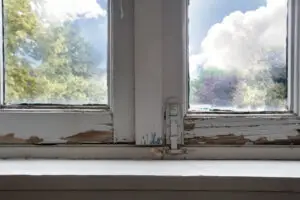Rotting windows can be a common issue for homeowners, causing not only a decrease in energy efficiency but also compromising the structural integrity of your home. Understanding the causes of window rot, recognizing the signs, and knowing how to prevent and repair it are crucial for maintaining a safe and comfortable living environment.
So, what causes windows to rot? Factors such as moisture, lack of maintenance, and exposure to extreme weather conditions can contribute to window rot. Signs of rotting windows include peeling paint, soft or spongy window frames, and visible mold or mildew.
To prevent and repair rot in windows, regular inspection and maintenance are key. This includes sealing any gaps, repainting, and sealing wooden frames, and replacing damaged window components.
What Causes Windows to Rot?
Windows can rot due to numerous factors, including moisture and water damage, lack of proper ventilation, and inadequate maintenance. Understanding these causes can help you prevent window rot and ensure the longevity of your windows.
Moisture and water damage are among the primary culprits behind window rot. When water seeps into the wood frames or sills, it can lead to rotting over time. This can occur due to leaks, condensation, or even high humidity levels in your home. If left unchecked, the moisture can penetrate deeper into the wood, causing structural damage and compromising the integrity of your windows.
Lack of proper ventilation is another factor that contributes to window rot. When windows are not adequately ventilated, moisture can become trapped inside, leading to increased humidity levels. This trapped moisture provides an ideal breeding ground for mold and mildew, which can accelerate the rotting process.
Inadequate maintenance also plays a significant role in window rot. Without regular inspections and upkeep, small issues like peeling paint, cracked caulking, or damaged weatherstripping can go unnoticed. These seemingly minor problems can allow moisture to infiltrate the windows and accelerate the rotting process.
Signs of Rotting Windows
Rotting windows can be a major issue for homeowners, causing not only aesthetic problems but also potential structural damage. It is important to be aware of the signs of rotting windows so that you can address the problem promptly. Here are a few common indicators:
Soft or Spongy Window Frames: One of the most obvious signs of rotting windows is when the frames feel soft or spongy to the touch. This is a clear indication that moisture has seeped into the wood, causing it to deteriorate.
Peeling or Bubbling Paint: Another sign of rotting windows is when the paint on the frames starts to peel or bubble. As moisture penetrates the wood, it causes the paint to lose adhesion and separate from the surface.
Visible Mold or Fungus Growth: Mold or fungus growth on or around the windows is a definite red flag. These organisms thrive in damp environments, so if you notice any discoloration or fuzzy patches, it is a sign that moisture has been trapped and rot has set in.
If you notice any of these signs, it’s crucial to take action right away. Ignoring the problem can lead to further damage, compromised energy efficiency, and even health hazards. At DaBella, we offer high-quality window replacement options that can help address rotting window issues. Our windows are designed to withstand the elements and provide superior insulation, ensuring long-term durability and energy savings.
How to Fix Rotten Window Frame
- Assess the Damage: Start by thoroughly inspecting the extent of the rot. Identify areas that need repair or replacement. Determine whether the rot is confined to the surface or has penetrated deeper into the frame.
- Remove Rotten Wood: Use a chisel, screwdriver, or utility knife to remove the rotted wood from the window frame. Take your time to ensure that you remove all decayed sections until you reach solid, healthy wood.
- Treat with Wood Hardener: Once the rotten wood is removed, apply a wood hardener to the remaining frame to stabilize and strengthen the wood fibers. Follow the manufacturer’s instructions for application.
- Fill with Epoxy Wood Filler: Fill the void left by the rotted wood with epoxy wood filler. This filler is durable and can be molded to match the contours of the frame. Apply it generously and smooth it out with a putty knife.
- Sand and Smooth: Once the epoxy filler has dried completely, sand the repaired area to achieve a smooth and even surface. Use fine-grit sandpaper to blend the filler with the surrounding wood.
- Prime the Surface: Apply a coat of primer to the repaired area to seal the wood and prepare it for painting. Choose a primer suitable for exterior wood surfaces and follow the manufacturer’s instructions for application.
- Paint or Stain: Finally, paint or stain the repaired window frame to match the rest of the window and protect it from moisture and decay. Apply multiple coats as needed, following proper drying times between coats.
Preventing Rot in Windows
Regular inspection and maintenance are key to preventing rot in windows. By regularly checking your windows for any signs of rot, you can catch the problem early and take necessary actions to prevent further damage. Look for any discoloration, soft spots, or peeling paint on the window frames, sills, and surrounding areas.
Proper sealing and weatherproofing is crucial in keeping your windows protected from moisture and preventing rot. Make sure to seal any gaps or cracks around the windows with caulk or weatherstripping. This will help keep water out and maintain the integrity of the window frames.
If you notice any rotted sections in your windows, it is important to address the issue promptly. Ignoring rotted areas can lead to further damage and potentially compromise the structural integrity of the windows. In some cases, you may need to replace the entire window frame. However, if the rot is localized to a specific section, it may be possible to replace only the affected area.
At DaBella, we offer a range of window solutions that are designed to be durable and resistant to rot. Our expert team can assess the condition of your windows and provide you with the best options for preventing and repairing rot.
Commonly Asked Questions
Can rotting windows be repaired?
Yes, in many cases, rotted windows can be repaired. The extent of the damage will determine whether repair is possible. A professional window contractor can assess the condition of your windows and recommend the best course of action. In some instances, minor rot can be filled and patched, while more severe cases may require complete window replacement.
How do you know if your windows are rotting?
There are a few telltale signs that your windows may be rotting. Look out for soft or spongy areas around the window frame, peeling or bubbling paint, discoloration, or an unpleasant musty odor. If you notice any of these signs, it is important to have your windows inspected by a professional to prevent further damage.
How much does it cost to replace a rotted window frame?
The cost of replacing a rotted window frame can vary depending on several factors, including the size of the window, the extent of the damage, and the materials used for replacement. It is best to schedule a consultation with a window contractor who can provide you with an accurate estimate based on your specific needs.
Does home insurance cover rotted windows?
Typically, home insurance does not cover rotted windows. Window rot is often considered a result of neglect or lack of maintenance, which is not covered by standard home insurance policies. However, it is always a good idea to review your policy or speak with your insurance provider to understand the specifics of your coverage.
Contact DaBella today for Your Window Replacement Project
If you are dealing with rotting windows in your home, it is crucial to address the issue as soon as possible. Not only can rotting windows compromise the structural integrity of your house, but they can also lead to energy loss, and water damage. At DaBella, we understand the importance of having reliable and efficient windows in your home, which is why we offer top-quality window replacement services.
When you choose DaBella for your window replacement project, you can expect outstanding craftsmanship and exceptional customer service. Our team of experienced professionals will work closely with you to assess your needs and recommend the best window options to suit your style and budget.
At DaBella, we take pride in offering a wide range of window styles to choose from. Whether you prefer the classic elegance of double-hung windows, the contemporary appeal of casement windows, or the unique character of bay windows, we have the perfect solution for you. Our Glasswing vinyl windows are not only aesthetically pleasing but also energy-efficient, helping you save on utility bills while keeping your home comfortable year-round.
With our extensive industry knowledge and expertise, we understand that every window replacement project is unique. That is why we provide personalized solutions to meet your specific requirements. Our team will handle every aspect of the installation process, ensuring a seamless and hassle-free experience from start to finish.
Contact DaBella today at 844-DaBella to schedule a consultation and learn more about our window replacement services. Let us help you transform your home with beautiful, durable, and energy-efficient windows. Do not let rotting windows compromise the safety and comfort of your living space – trust the experts at DaBella for all your window replacement needs.

